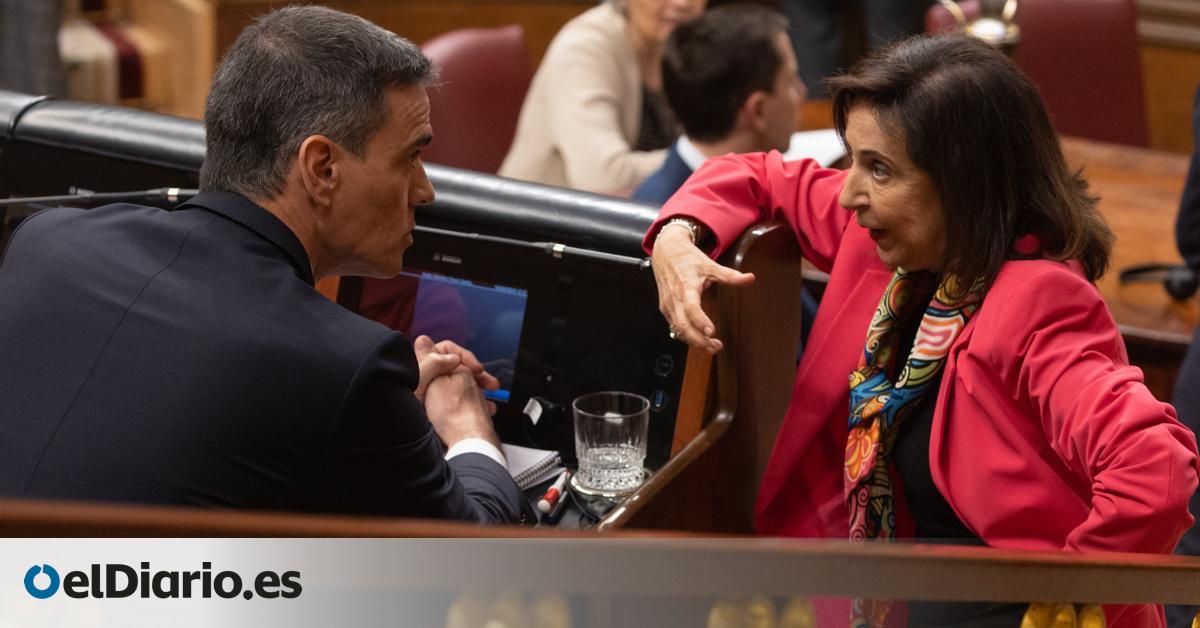
The outbreak of the Ukraine War for the Russian invasion in February 2022 changed some substantive dynamics in the functioning of the coalition government led by Pedro Sánchez that remain intact more than three years later. Neither before with Unidas Podemos nor now with adding, the president has ever had the support of his executive partner to face the increase in the investment in defense required by the European Union and NATO. Something that has not prevented, however, that this increase in the items for military spending has risen at more than 10,000 million euros since the PSOE leader stepped on the Moncloa. And most of the time with the same formula: an agreement of the Council of Ministers promoted discreetly, without the need to be revalidated in Congress and with the more or less discreet objection of non -socialist ministers.
Just that formula was repeated on Tuesday. As confirmed by the spokesman, Pilar Alegría, the Council of Ministers gave the green light to 2,084 million euros dedicated “to the modernization, maintenance and improvement of the troops, infrastructures and facilities attributed to the Ministry of Defense.” A credit transfer from the Ministry of Finance “to attend programs and contracts that were already underway” that the ministers of Sumar rejected symbolically and as usual during the ministerial conclave.
According to the Executive, the case of this week’s budget adjustment corresponds to past commitments with “multiannual investment programs”. That is, the 2,084 million approved on Tuesday do not compute as part of the committed increase until 2% of GDP but with previous spending obligations. These same sources explain that the formula of the agreement in the Council of Ministers through credit transfers is explained by the absence of general state budgets that allow them to incorporate those items.
Without accounts in view, government plans for future investments follow the same scheme. In the absence of a solid parliamentary majority that guarantees the success of the voting, the road map of Pedro Sánchez goes to take steps in the increase in military spending via Council of Ministers with the legal margins allowed by the Defense Law and the credit modifications that the Ministry of Finance usually promotes.
According to the Ministry of Margarita Robles, the investments destined to the computation committed to NATO that is stated in 2% of GDP or have yet been completed or still passed by the Council of Ministers. The government expects, among other things, to specify with the Atlantic Alliance how much money should contribute and what effort will be officially recognized to Spain, currently set at 1.28% of GDP. The Sánchez Executive believes, however, that the deployment of resources is much greater if it is taken into account games such as peace missions abroad, safety at the southern border or cybersecurity investment.
Objections in the coalition
All these expenses have been approved despite the opposition of the government’s minority partner, first as United Podemos, in the last legislature, and how to add from December 2023. In his last appearance in Congress, Sánchez reminded him of the general secretary of Podemos, Ione Belarra, which much of the increase in military spending had been done with her in the government as a minister.
“We have done it with you in the Government and you said nothing,” said the chief of the Executive to Belarra, who in recent weeks has called Sánchez “Lord of War.” At that time, the leader of Podemos came to qualify the PSOE as a war party, in one of the most tense moments of the coalition government.
In parallel, the ministers of United We can with Yolanda Díaz in front presented observations to all the items that the government was approving to increase military spending. In total, up to 12 objections to this type of credits, as sources of Sumar have recalled in recent hours, which collect data from the two legislatures. It is a symbolic opposition that has no real consequences on those items.
Since the coalition led by Yolanda Díaz, they have requested on Tuesday a “deep debate” within the government on the defense policy. “We have presented up to 12 observations,” the spokeswoman for the Plurinational Group, Verónica Martínez, asked about this new game, which considers that “without a previous assessment” of where that expense is directed, the spokeswoman.
In the field of adding, they recognize that they have little room to change the PSOE plans in this regard. The socialist part of the Government responded to the observations with “common places”, according to sources of the coalition of parties, based on the fact that these items are part of multiannual commitments voted in the past within the general state budgets.
The Second Vice President recalled on occasion that the commitment to reach 2% of the defense spending acquired it before the NATO, former president Mariano Rajoy. “Sometimes you are synthesis and sometimes not, we try to fight it, but we are a minority in the government,” admits a minister of adding, which remembers however, for each euro in military increase, 16 social spending has been allocated.
The Bank of Spain gives free way to financing
The change of priorities in Europe, which has decided to open the hand with public spending to raise investment in defense, has different derivatives. One of them affects banking, which sees a new business generation opportunity. For its local supervisor, the Bank of Spain, this step is not any problem, provided that the entities continue to comply with solvency data. Something that, at least for the moment, is not in doubt despite the growing level of geopolitical uncertainty.
“The Bank of Spain asks that the risks be measured,” said Tuesday the Supervision Director of the Bank of Spain, Mercedes Olano. “We are going to see him,” he deepened. Precisely, the supervisor has demanded that entities strengthen their abilities to face severe geopolitical shocks, such as the one that is currently living with the tariff war. But as for the investment in defense “there is no legal clipper to finance projects” in this sector, although “we will have to see how they fit”, in that solvency data that, for now, do not worry the Bank of Spain.
In fact, Olano acknowledged that this bar of banks “is at maximum.” “The banks will think or not to finance defense projects depending on whether they consider it appropriate or not. The only thing the supervisor does is ask that the banks properly measure the risk of these projects and, depending on that risk, provide adequate provisions and capital,” Olano summarized.
And the financial sector has appetite to invest. On Friday, the president of Banco Santander, Ana Botín, set an example to Germany regarding the new ambition to increase public spending, especially in defense, and in how banks can be key to channeling that investment. Something that “does not require new legislation.” “Structural changes and an institutional context are required that allows our companies to grow, that the companies that are created in Europe are left,” he said during the entity’s annual shareholders board.
This Tuesday, Ángel Simón, CEO of Criteriacaixa, the investment arm of the La Caixa Foundation, also pointed out that same appetite. “We do not rule out investing in defense,” he acknowledged, although he put nuances. “In criteria we cannot invest in play, alcohol, tobacco or armament,” because its statutes prevent it, “but defense is not only armament, but also the civil technological sector,” he added. A segment, where, for example, included cybersecurity investments.
Source: www.eldiario.es

